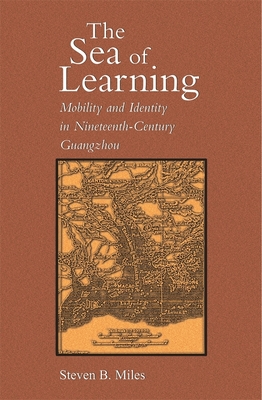

 Harvard University Press
Harvard University Press
The Sea of Learning: Mobility and Identity in Nineteenth-Century Guangzhou


Key Metrics
- Steven B Miles
- Harvard University Press
- Hardcover
- 9780674021341
- 9.18 X 6.4 X 1.48 inches
- 1.72 pounds
- History > Asia - China
- English
 Secure Transaction
Secure TransactionBook Description
In 1817 a Cantonese scholar was mocked in Beijing as surprisingly learned for someone from the boondocks; in 1855 another Cantonese scholar boasted of the flourishing of literati culture in his home region. Not without reason, the second man pointed to the Xuehaitang (Sea of Learning Hall) as the main factor in the upsurge of learning in the Guangzhou area. Founded in the 1820s by the eminent scholar-official Ruan Yuan, the Xuehaitang was indeed one of the premier academies of the nineteenth century.
The celebratory discourse that portrayed the Xuehaitang as having radically altered literati culture in Guangzhou also legitimated the academy's place in Guangzhou and Guangzhou's place as a cultural center in the Qing empire. This study asks: Who constructed this discourse and why? And why did some Cantonese elites find this discourse compelling while others did not? To answer these questions, Steven Miles looks beyond intellectual history to local social and cultural history. Arguing that the academy did not exist in a scholarly vacuum, Miles contends that its location in the city of Guangzhou and the Pearl River Delta embedded it in social settings and networks that determined who utilized its resources and who celebrated its successes and values.
Author Bio
A common theme in Steven Miles' research projects has been the physical movement of people across space, from the early nineteenth-century literatus Xie Lansheng’s peregrinations in urban Guangzhou to Cantonese merchants trading on the Guangxi-Vietnam border, to global Chinese migration.
Miles' first book, The Sea of Learning (2006), explores the in-migrating, socially ascendant, urban elite in the southern Chinese city of Guangzhou (Canton) who embraced new trends in literature and scholarship promoted at the city’s fashionable academy, the Xuehaitang.
His second book, Upriver Journeys: Diaspora and Empire in Southern China, 1570-1850, traces a range of “diasporic” activities – from serving as officials, to acquiring land and registering as students in upriver schools in order to sit for less competitive civil service examinations there, to conducting trade, to obtaining wives or concubines, to touring – that Cantonese men pursued upstream along the West River basin. A recently completed monograph, Opportunity in Crisis, explores the history of migration during the breakdown of the Qing order in southern China in the mid-nineteenth century and the reconsolidation of Qing control in the late-nineteenth century. Set in Guangxi, it tells the little-known story of the mid-century wars between Triads and river pirates, on one hand, and Qing loyalists and carpetbaggers, on the other.
Both of these books are supported by "Cantonese Migrant Networks", a database of epigraphical materials from the West River basin.
Chinese Diasporas: A Social History of Global Migration, forthcoming from Cambridge University Press, is a general history of internal and external Chinese migration from the sixteenth century to the present day.
For his next project, Miles plans to return to urban history while retaining his interest in the movement of the people across space. Under the theme of "seasonality and cities", he will explore the rhythm of urban life in nineteenth-century China, the many interconnected ways in which political, economic, leisure, and ritual activities were patterned according to seasons.
Source: Washington University St Louise Arts & Sciences
Videos
No Videos
Community reviews
Write a ReviewNo Community reviews